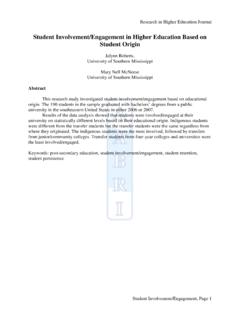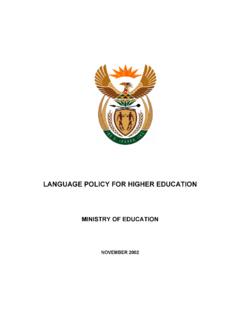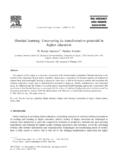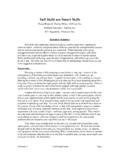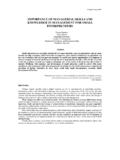Transcription of “Better Policies” Series MEXICO - OECD.org
1 Paris2, rue Andr Pascal, 75775 Paris Cedex 16 Tel.: +33 1 45 24 82 00 better policies Series MEXICOPOLICY PRIORITIES TO UPGRADE THE SKILLS AND KNOWLEDGE OF MEXICANS FOR GREATER PRODUCTIVITY AND INNOVATIONMAY 2015 This document is published on the responsibility of the Secretary-General of the OECD. The opinions expressed and arguments employed herein do not necessarily reflect the official views of OECD member countries.**This document and any map included herein are without prejudice to the status of or sovereignty over any territory, to the delimitation of international frontiers and boundaries and to the name of any territory, city or statistical data for Israel are supplied by and under the responsibility of the relevant Israeli authorities.
2 The use of such data by the OECD is without prejudice to the status of the Golan Heights, East Jerusalem and Israeli settlements in the West Bank under the terms of international law.**This document is part of the better policies Series . Under the guidance of Gabriela Ramos and Juan Yermo, Isabell Koske coordinated the publication, with the help of Hector Tajonar De Lara. Main contributors: Rolando Avendano, Julio Bacio Terracino, Kris Boschmans, Sarah Box, Stijn Broecke, John Davies, Agustin Diaz-Pines, Sean Dougherty, Sean Ennis, Alessandro Goglio, Sandrine Kergroach, Andrew Macintyre, Fabio Manca, Angel Melguizo, Guillermo Montt, Sebastian Nieto-Parra, Stephen Perkins, Beatriz Pont, Jonathan Potter, Andreas Schleicher, Tatyana Teplova, Diana Toledo Figueroa.
3 Isabelle Renaud provided production and administrative credits: Cover Painting by Mexican artist Carlos TorresCorrigenda to OECD publications may be found on line at: OECD 2015 You can copy, download or print OECD content for your own use, and you can include excerpts from OECD publications, databases and multimedia products in your own documents, presentations, blogs, websites and teaching materials, provided that suitable acknowledgment of the source and copyright owner is given. All requests for public or commercial use and translation rights should be submitted to Requests for permission to photocopy portions of this material for public or commercial use shall be addressed directly to the Copyright Clearance Center (CCC) at or the Centre fran ais d exploitation du droit de copie (CFC) at FOR ECONOMIC CO-OPERATION AND DEVELOPMENTThe OECD is a unique forum where governments work together to address the economic, social and environmental challenges of globalisation.
4 The OECD is also at the forefront of efforts to understand and to help governments respond to new developments and concerns, such as corporate governance, the information economy and the challenges of an ageing population. The Organisation provides a setting where governments can compare policy experiences, seek answers to common problems, identify good practice and work to co-ordinate domestic and international OECD member countries are: Australia, Austria, Belgium, Canada, Chile, the Czech Republic, Denmark, Estonia, Finland, France, Germany, Greece, Hungary, Iceland, Ireland, Israel, Italy, Japan, Korea, Luxembourg, MEXICO , the Netherlands, New Zealand, Norway, Poland, Portugal, the Slovak Republic, Slovenia, Spain, Sweden, Switzerland, Turkey, the United Kingdom and the United States.
5 The European Union takes part in the work of the Publishing disseminates widely the results of the Organisation s statistics gathering and research on economic, social and environmental issues, as well as the conventions, guidelines and standards agreed by its better policies SeriesThe Organisation for Economic Co-operation and Development (OECD) aims to promote better policies for better lives by providing a forum in which governments gather to share experiences and seek solutions to common problems. We work with our 34 members, key partners and over 100 countries to better understand what drives economic, social and environmental change in order to foster the well-being of people around the world.
6 The OECD better policies Series provides an overview of the key challenges faced by individual countries and our main policy recommendations to address them. Drawing on the OECD s expertise in comparing country experiences and identifying best practices, the better policies Series tailor the OECD s policy advice to the specific and timely priorities of member and partner countries, focusing on how governments can make reform In recent years, MEXICO has distinguished itself for having a solid macroeconomic framework with low inflation and strong openness to international markets. This has increased the country s attractiveness as a destination for international investment, which is increasingly flowing into high value-added sectors.
7 Since recently, MEXICO hosts a large number of modern firms, notably in the sectors of aerospace, automobiles, foods and beverages, which employ high-skilled and well-educated workers. But other parts of the economy are characterised by high informality, low-skilled work, weak productivity and out-of-date technologies. As a result, the Mexican economy experienced a prolonged growth slowdown during the past three decades, leaving it behind other OECD countries and hurting the population s relative living standards. Fully unleashing the country's potential and lifting productivity also in the sectors that are lagging behind requires a comprehensive programme to improve the skills of all Mexicans, both at school and in the labour market.
8 To this end, the objective of the education reform to increase the quality and relevance of education is key, as is motivating students to pursue education . This will also increase the value that Mexican society attributes to education . In contrast to other OECD countries, having a better education in MEXICO does not necessarily reduce the risk of unemployment. The education system also needs to become more equitable to guarantee that all Mexicans have the same opportunities to succeed. In addition, it is crucial to avoid a further deterioration of the skills of low-skilled workers employed in precarious jobs that do not provide any training opportunities.
9 This requires a commitment not only by the authorities, but also by businesses that need to invest in their workers and by society at large. This is important to improve the growth and well-being perspectives but also to face the demands of the information economy and the profound changes in the global economy. The improvement of Mexicans skills must be accompanied by other policies to enhance the innovation and business environment, including the modernization and expansion of infrastructure. Only a holistic approach is likely to help the country move up the value chain and become a knowledge economy.
10 The current administration, alongside other political actors, managed to approve an impressive package of economic reforms, promoted through the so-called Pact for MEXICO (Pacto por M xico), which aims at boosting growth, fighting labour market informality and reducing the country s high levels of income inequality. As part of the Pact, major structural reforms have been legislated to raise competition, enhance the quality of education , improve the functioning of the labour market and the tax system, and improve the performance of energy, financial, infrastructure, and telecommunications sectors.











